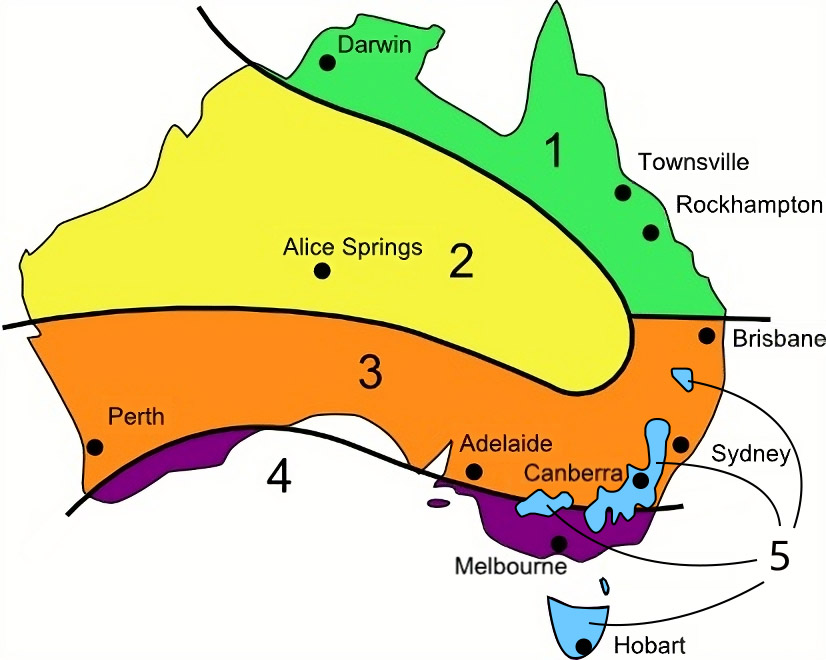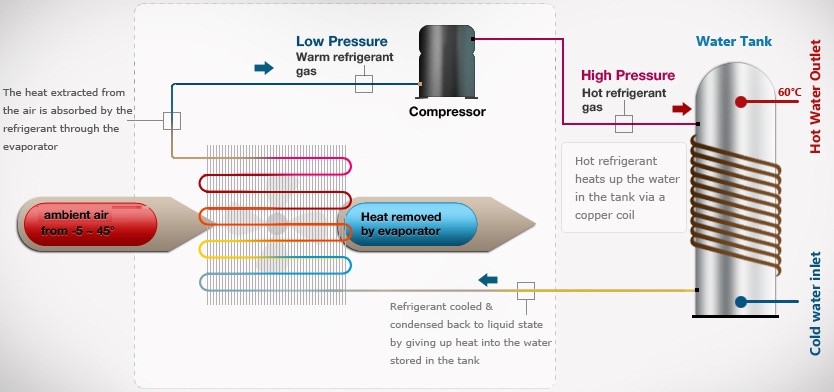Heat Pump Solar Hot Water Systems
Heat pumps are pretty simple to understand. Get an air conditioner, run it in heating mode, and use the heat it blows out to warm a well-insulated cylinder of water.
That’s all there is to it folks!
Here’s a diagram that shows the operation in a bit more detail, including how the heating energy is transferred to the water by compressed refrigerant that flows through a coil inside the hot water cylinder:
Now – many argue that it is not true solar. I’m an electrical engineer. My worst marks at university were always in the thermodynamics class. So I’m not qualified to argue. But I will anyway!
To my brain, a heat pump transfers the energy that is already in the surrounding air and ‘pumps’ it into the water. This energy’s original source is, of course, the sun. So I’d argue that a heat pump is solar powered with an electric boost.
Further – because of its low power draw and time-agnostic electricity demand, a heat pump is an ideal way to use solar electricity to heat water.
That’s because a heat pump is driven with electricity but is around 3 times more efficient than a conventional ‘kettle’ style electric heater. In fact, the CSIRO calculates that in some Australian climate zones it can use less electricity over a year than a solar panel hot water system with an electric boost.
Here are the pros and cons of a heat pump system over a ‘conventional’ solar hot water system:
Pros:
- No roof-mounted hardware – leaving all your roof free for Solar PV panels.
- Easy to protect from hail and storm damage
- Doesn’t require direct sunlight – so it will work in all weathers.
- No danger of overheating in summer.
- Relatively simple (i.e. about 50% cheaper!) installation than panel-based solar hot water systems.
- Doesn’t matter when you run them – so you can take advantage of off-peak electricity tariffs
- You can power them directly from your solar electricity instead of the grid
Cons:
- The compressor can be noisy.
- Work most efficiently in warm-hot climates. i.e. they cost more to run in cold climates.
- Some may use R134A refrigerant — a greenhouse gas around 1,430 times stronger than CO2.
- Lack of panels means the neighbours won’t know you have a solar-powered hot water system (less green street-cred)!
When are heat pumps the better choice?
If you live in climate zones 1 or 2 (see below), your hot water use is likely to be modest, so you’ll see less benefit from switching to heat pump hot water. But for the rest of the country you can save significantly on energy bills by switching from gas or conventional electric hot water to a heat pump.

For the greatest energy savings, if you have solar PV on your roof, set the heat pump to run in the middle of the day. This means it will mostly run off “free” solar power and heat pumps also operate more efficiently during the day when it’s warmer.
